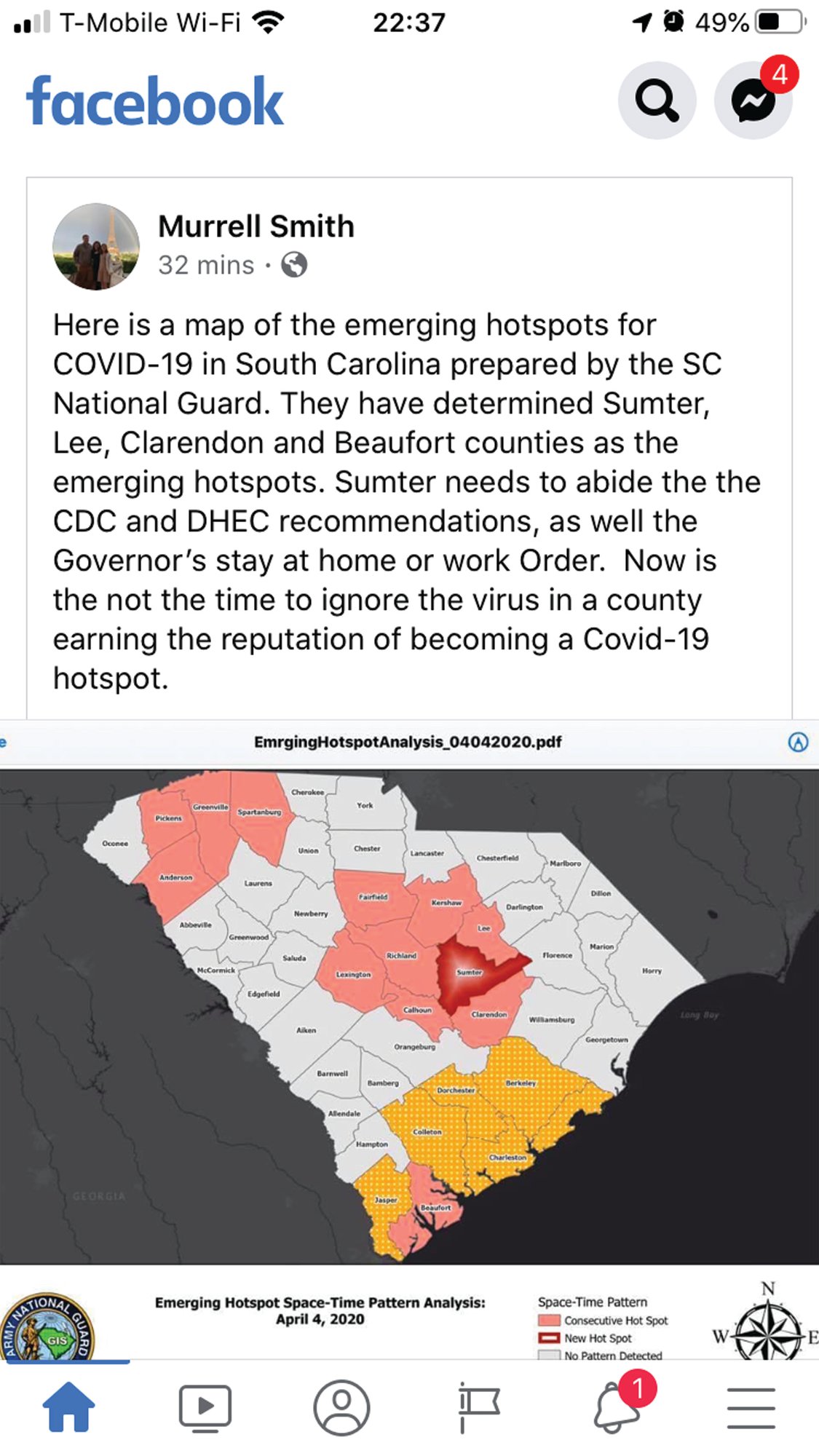Sumter, Midlands 'hot spot' for virus
S.C. National Guard planning for state's potential needs with designations
All our coronavirus coverage is free to the public. It’s the right thing to do as a public service to our community. If you find this article helpful or informative and want to support our continued coverage, please support us with a tax-deductible donation.
To find all our coronavirus coverage, including helpful local resources and website links, click here.
---
Given counts from recent daily releases on confirmed COVID-19 cases and expected projections going forward by state public health officials, Sumter County is listed as an emerging new "hot spot" in the state for COVID-19, according to the state Army National Guard.
Capt. Jessica Donnelly with the S.C. Army National Guard and other officials spoke Wednesday on Sumter's designation, which is consistent with most counties in the Midlands region.
The state Guard is developing emerging "hot spot" analysis maps of the state's 46 counties for the new coronavirus to help with planning for potential support to those counties that may need the Guard in terms of resources, Donnelly said.
"We can use the data where these potential impacted areas may be able to talk with those counties to see if they need resources from the National Guard," Donnelly said.
An example of a need that a county may have going forward with COVID-19 is with its health care systems, she said.
The state's health care system may be able to handle its bed needs during the pandemic, according to Donnelly, but if not, then a plan will be in place.
At this time, the Guard, with other state entities such as the state Emergency Management Division, is working with some counties to identify alternative care facility sites.
"Just as the health care system reaches their current capacity," Donnelly said, "they would have these alternate care facilities that will have already been assessed and meet certain criteria in order to place non-critical patients at. So, we are looking at those types of facilities now, and working with the counties for those needs, in order for there to be a plan in place before we get to the point of the need."
Through the plan, the state is looking to increase its bed capacity by 3,000 by May 5.
Essentially, the Guard is using the confirmed case data and DHEC projections to create a plan, based on many unknowns, for how the state may need its help, she added.
The particular emerging "hot spot" map from the Army National Guard viewed Wednesday showed 18 of the state's counties having some form of that designation.
Sumter was listed as an "emerging hot spot," while Clarendon, Lee, Kershaw, Richland, Lexington, Calhoun and Fairfield counties in the greater Midlands were shown as "consecutive hot spots."
Other "hot spot" counties in the state included Greenville, Spartanburg, Pickens and Anderson in the Upstate and Beaufort in the Lowcountry region.
Also in the Lowcountry, Berkeley, Charleston, Dorchester, Jasper and Colleton counties were listed as "sporadic hot spot" counties.
With the designations, all metropolitan area counties of the state had some "hot spot" designation, except Horry County along the coast and Aiken County.
Horry and Aiken and the other 27 counties - mostly rural - in the state were identified in the Army National Guard map as "no pattern detected" at this time.
When contacted Wednesday, Prisma Health Tuomey officials and Sumter County Administrator Gary Mixon said they were unaware of any such official designation from the Army National Guard.
Various officials acknowledge information is fluid and rapidly changing.
In a social media post Tuesday night, state Rep. Murrell Smith, R-Sumter, posted a map of the hotspots in South Carolina prepared by the Guard.
Smith stated in the post that "Sumter needs to abide" by the CDC and DHEC recommendations, as well as the Gov. Henry McMaster's home or work order.
Sen. Thomas McElveen, D-Sumter, also shared the same information in another social media post.
Officials have said the projections are not entirely unexpected and have been proven already via DHEC's heat map that shows the spread of the virus. Staff at Prisma Health Tuomey Hospital has been preparing regardless of the "hot spot" designation feels prepared and ready to take care of COVID-19 patients.
"Prisma Health Tuomey Hospital is working with SCDHEC to stand up an alternate care site in the event of a potential surge in emergency department patients," said Susan Gaymon, director of nursing at Tuomey. "We want to be sure that we are ready to meet the needs of the community when they arise. We are proactively planning this site to receive patients with respiratory symptoms."
"In alignment with the Prisma Health facilities, Prisma Health Tuomey Hospital is taking the necessary steps to prepare for the anticipated surge in COVID-19 patients. Prisma Health leadership is considering alternative care sites and readying additional inpatient capacity to meet the needs. Prisma Health Tuomey Hospital stands ready to provide high-quality care for the patients in its region, as they have already been working collaboratively with Kershaw Health, McLeod Clarendon and the Department of Corrections. If patients require a higher level of care, like always, those patients will be transferred to Columbia-based Prisma Health hospitals," said Prisma Health Tuomey CEO Michelle Logan-Owens.

